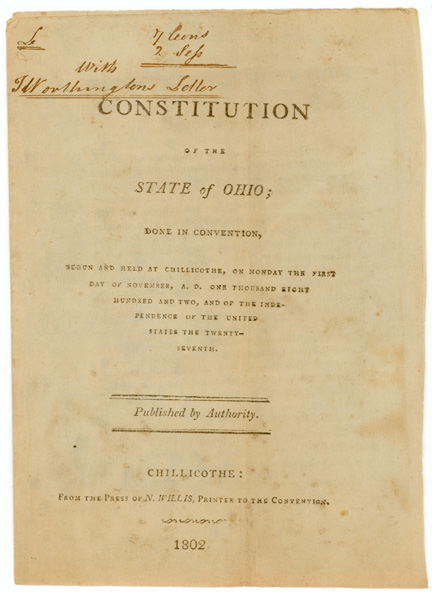 The Tea Party-backed effort to put an issue on the ballot "nullifying" the health care reform's individual mandate is in the news because its supporters aren't getting enough signatures. The even wackier "Ohio Sovereignty Amendment" is not in the news, presumably because it is doing even worse.
The Tea Party-backed effort to put an issue on the ballot "nullifying" the health care reform's individual mandate is in the news because its supporters aren't getting enough signatures. The even wackier "Ohio Sovereignty Amendment" is not in the news, presumably because it is doing even worse.
If they passed, neither of these amendments to the Ohio Constitution would actually accomplish much, other than pulling the state into Federal litigation that it would lose.
The health care amendment states that no Ohioan can be required to purchase health insurance. The Sovereignty Amendment goes farther, purportedly restricting the Federal Government's jurisdiction in Ohio and therefore its ability to enforce any number of laws.
But the states can't do that. Article VI of the U.S. Constitution includes the "Supremacy Clause" which states:
- "This Constitution, and the Laws of the United States which shall be made in Pursuance thereof; and all Treaties made, or which shall be made, under the Authority of the United States, shall be the supreme Law of the Land; and the Judges in every State shall be bound thereby, any Thing in the Constitution or Laws of any State to the contrary notwithstanding."
It is odd that the news coverage of these amendments does not mention this problem. It isn't a big deal at this point, given that they are no where close to getting either amendment on the ballot, but even when the amendments first made news, the supremacy problem has generally received scant attention. If either amendment unexpectedly grows legs, it would be a good thing for the media to start paying attention to the fact that neither actually accomplishes what the proponents claim.
The supporters of both amendments answer that they can nullify Federal laws when the national government has overstepped its authority. The short answer to this is that it's still the Supreme Court that has the final say over whether the Federal government has exceeded its jurisdiction, not the states.
Take this as my first post in a promised series regarding the Sovereignty Amendment. The longer answer to the jurisdiction question will be upcoming.



0 comments:
Post a Comment